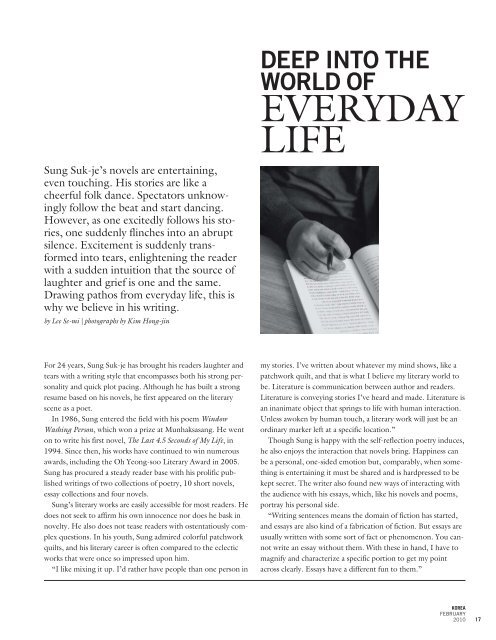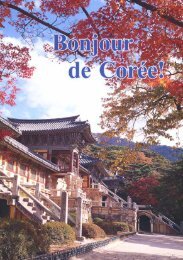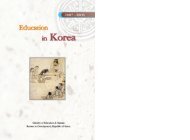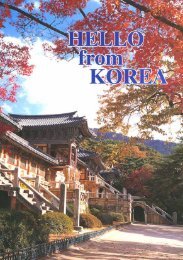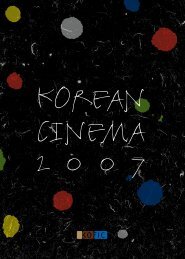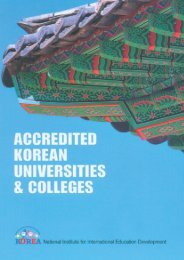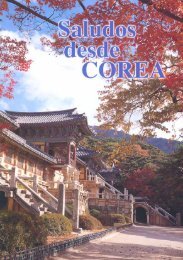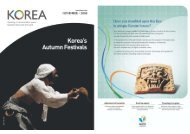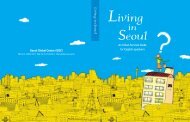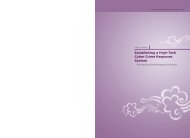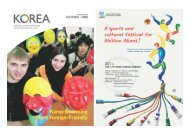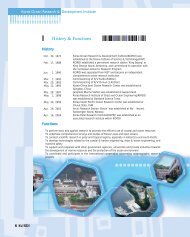www.korea.net
KOREAN MOVIES - Korea.net
KOREAN MOVIES - Korea.net
- No tags were found...
You also want an ePaper? Increase the reach of your titles
YUMPU automatically turns print PDFs into web optimized ePapers that Google loves.
DEEP INTO THE<br />
WORLD OF<br />
EVERYDAY<br />
LIFE<br />
Sung Suk-je’s novels are entertaining,<br />
even touching. His stories are like a<br />
cheerful folk dance. Spectators unknowingly<br />
follow the beat and start dancing.<br />
However, as one excitedly follows his stories,<br />
one suddenly flinches into an abrupt<br />
silence. Excitement is suddenly transformed<br />
into tears, enlightening the reader<br />
with a sudden intuition that the source of<br />
laughter and grief is one and the same.<br />
Drawing pathos from everyday life, this is<br />
why we believe in his writing.<br />
by Lee Se-mi | photographs by Kim Hong-jin<br />
For 24 years, Sung Suk-je has brought his readers laughter and<br />
tears with a writing style that encompasses both his strong personality<br />
and quick plot pacing. Although he has built a strong<br />
resume based on his novels, he first appeared on the literary<br />
scene as a poet.<br />
In 1986, Sung entered the field with his poem Window<br />
Washing Person, which won a prize at Munhaksasang. He went<br />
on to write his first novel, The Last 4.5 Seconds of My Life, in<br />
1994. Since then, his works have continued to win numerous<br />
awards, including the Oh Yeong-soo Literary Award in 2005.<br />
Sung has procured a steady reader base with his prolific published<br />
writings of two collections of poetry, 10 short novels,<br />
essay collections and four novels.<br />
Sung’s literary works are easily accessible for most readers. He<br />
does not seek to affirm his own innocence nor does he bask in<br />
novelty. He also does not tease readers with ostentatiously complex<br />
questions. In his youth, Sung admired colorful patchwork<br />
quilts, and his literary career is often compared to the eclectic<br />
works that were once so impressed upon him.<br />
“I like mixing it up. I’d rather have people than one person in<br />
my stories. I’ve written about whatever my mind shows, like a<br />
patchwork quilt, and that is what I believe my literary world to<br />
be. Literature is communication between author and readers.<br />
Literature is conveying stories I’ve heard and made. Literature is<br />
an inanimate object that springs to life with human interaction.<br />
Unless awoken by human touch, a literary work will just be an<br />
ordinary marker left at a specific location.”<br />
Though Sung is happy with the self-reflection poetry induces,<br />
he also enjoys the interaction that novels bring. Happiness can<br />
be a personal, one-sided emotion but, comparably, when something<br />
is entertaining it must be shared and is hardpressed to be<br />
kept secret. The writer also found new ways of interacting with<br />
the audience with his essays, which, like his novels and poems,<br />
portray his personal side.<br />
“Writing sentences means the domain of fiction has started,<br />
and essays are also kind of a fabrication of fiction. But essays are<br />
usually written with some sort of fact or phenomenon. You cannot<br />
write an essay without them. With these in hand, I have to<br />
magnify and characterize a specific portion to get my point<br />
across clearly. Essays have a different fun to them.”<br />
KOREA<br />
FEBRUARY<br />
2010<br />
17


